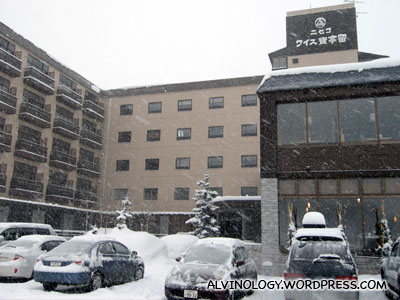As a travel writer and a fan of travel writing, I am constantly reading the stories of others and sometimes, I do roll my eyes and think, “yeah right, you’re making this up. You’re just trying to make everyone envious of you having the perfect trip.” There is a fine line between retelling a story in your own words and exaggerating it to a point where it becomes fiction. Today, I shall test some of the stories in travel writing I have stumbled upon over the years and I’ll evaluate just how likely something like that would happen. I don’t want to offend any other travel writers just in case I accuse them of lying when they were not – so I shall paraphrase the original stories in a way to make it a more general scenario, let’s see if I find these stories believable!
 |
|
Yes, that’s me in a castle in North Wales. |
Scenario 1: “Come and join us for a meal”
“We were in a beautiful rural village, just walking along the coast road when we came across some farm houses. I asked the farmer for directions to make sure that we were heading the right way back to town when he said that his family were about to have lunch, he asked if we have eaten and I said no. He then invited us to have lunch with his family as it was a Sunday and the local shops would all be shut. His wife then appeared and said there was plenty of food for everyone – so we accepted their kind invitation and had a lunch of flat bread, salad, cheeses and grilled fish had been freshly caught that morning. They even offered me some very sweet oranges from the tree in their courtyard. I have heard that the locals were friendly but their hospitality is genuine – they are just pleased to see visitors from another country.”
Is the story believable?
Yes, it can happen, but not often. Note that the writer approached the farmer (and not the other way round) and clearly, the writer and the farmer speak the same language (or at least the writer is able to speak some of the farmer’s language). From experience, I have encountered plenty of friendly locals who have gone out of their way to help me when I am traveling – but the two preconditions are that you have to firstly, be the one who initiates contact with the local and secondly, you must have a language in common with the local person. But get real, please: do not expect locals to run up to you offering free food just because you’re visiting their town, it doesn’t work like that. Think about it: if you see a tourist walking down the street, why would you have any reason to go up to them and talk to them? No, under normal circumstances, you’d just leave them alone unless they ask you for help, then you will have the chance to be helpful.
 |
|
Sharing food is a very common means of socializing |
Have I experienced something similar?
Yes actually, on several occasions in fact. I remember once when I was in Kairouan, Tunisia – we were visiting a museum and found that we practically had the place to ourselves as it was 41 degrees. It was so hot that most of the tourists stayed away. It seems to be a mother and son working there and they were having lunch – when they realized that I spoke French, they were very keen to find out what country I was from given that you don’t get too many foreigners in a place like Kairouan. As the conversation got going, they insisted that I sat down and once I did, food was placed in front of me and given how friendly they were, I felt it was too nice an opportunity to pass up (and it might have been rude to refuse). the food was average, it was couscous with some kinda vegetable stew with bits of chicken, but it was just nice to be able to sit and talk with them, to make new friends like that. If I didn’t speak French fluently, then that conversation wouldn’t have started and we wouldn’t have receive that invitation to dine with them.
Scenario 2: Hitchhiking your way across the country.
“It was both a fun way and a cheap way to see the country, as a hitchhiker. Yes, it is just like in the movies. You stand at the side of the road and thumb a ride, I would write on a piece of paper the name of the next town or city I was hoping to get to. Sure enough, within a reasonable amount of time, someone would stop and either they’ll take me all the way or they’ll say, I’m only going as far as the next town where I an drop you off. I never found it dangerous, you just gotta have faith in human nature. The only downside is if you want to be in a certain place at a certain time, then you just have to buy a train or bus ticket. I’ve met some amazing people as a hitchhiker, some of these car journeys have been epic and I totally recommend it.”
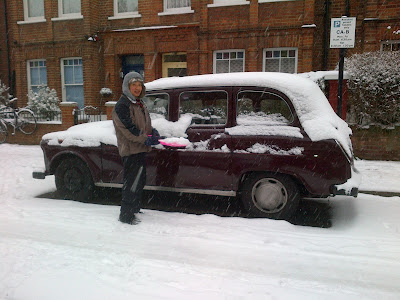 |
|
Why pay for a taxi when you can hitchhike? Well… |
Is this story believable?
Not really. Sorry, but I just don’t buy it. I’m not saying that you can’t hitchhike – it is possible of course but it is difficult at the best of times. You could find yourself standing by the side of the road for ages, feeling extremely frustrated. It can also be somewhat dangerous as you don’t know who is going to stop for you – if you’re a fat ugly guy with a beard then the chances you hitching a ride is far less than a pretty young lady in a very short skirt, but then again, if you were a pretty young lady in a very short skirt, you may attract attention from the wrong kind of men when trying to hitch a ride. You can hitch a ride if you’re desperate, like if you’ve missed the last bus and you’re facing a really long walk, but don’t get your hopes up.
Have I experienced something similar?
A few times actually, all in Europe (and under desperate circumstances). Let me tell you about the one in Wales. I was in Anglesey in North Wales when I decided to take the bus out to some beautiful ruins of an Abbey in the middle of nowhere. I had left it very late in the day and realized I had missed the last bus back to Beaumaris (where I was staying). I was faced with a 6 mile (9.65 km) back to town and it was getting dark and started raining. I thought, what have I got to lose: I have such a long walk back. I started trying to thumb a ride every time a car went by and it took me about 30 minutes or so before a car stopped and he said, “oh I’m not going to Beaumaris but I can take you about halfway there.” I said fine and got into the car.
 |
|
I adore Wales – visit Wales! |
Here’s the thing, he spoke to me in English because I looked foreign but I replied in Welsh. And the moment I sat down, he did a double take and asked me, “wait, did you just speak to me in Welsh? Wyt t’in gallu siarad Cymraeg?” And I said, “Ydw, dw i’n gallu siarad Cymraeg!” He was so intrigued as to why I spoke Welsh fluently and we started chatting in Welsh as he drove. Before I knew it, I suddenly realized that he had driven me all the way to Beaumaris despite the fact that he was not headed that way – but he had done me a favour because I spoke his language. Practically all visitors to Wales assume that the locals speak English and don’t even make an effort to speak a word of Welsh, but he was so blown over by the fact that I have spent years studying his language that he drove me right to my doorstep. Mind you, had I not missed the last bus, I wouldn’t have met this kind Welshman and had that lovely conversation with him – in Welsh.
Scenario 3: Free upgrade for nice people?
“When we arrived at the resort, I asked the manager nicely if they were fully booked, knowing that it was before the peak season and it was highly unlikely that they were. I hinted at an upgrade – just subtly, knowing that if I had been too blatant about it they would probably say no. I continued being really friendly and polite with the staff, tipping generously of course. Many of the other guests at the resort do not even acknowledge the staff working there, but I would greet them, chat with them, even flirt with some of them. Sure enough, on the morning of the third day, the manager gave me an upgrade to a deluxe suite which would have cost a lot more than the standard one I had paid for. I’m not saying this works all the time but in this world: you don’t ask, you don’t get and I’m not afraid to ask. Just try it, what have you got to lose?”
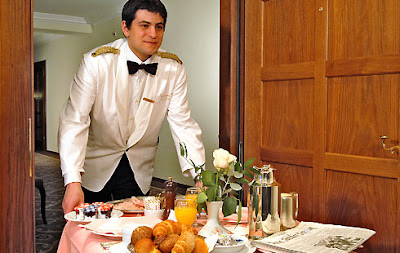 |
|
Is it that easy to get something for free at hotels? |
Is this believable?
Not really, I’m afraid. Of course we should all be nice to the staff at hotels, airports and other places we visit, but they don’t give out free upgrades so easily. Firstly, as the writer pointed out, availability is key: it doesn’t matter how much you try to bribe the management, if the hotel is fully booked, there’s really nothing they can give you. Secondly, the manager(s) you encounter may not have the authority to approve an upgrade – there may be a more senior manager/director hiding in an office somewhere who may be the decision maker, so you may be wasting your time bribing someone too low on the food chain to grant you that upgrade. The staff need a valid reason to give you an upgrade (see my story below). I’m not saying that it is impossible – but it is highly unlikely, by all means ask, but don’t get your hopes up!
Have I experienced something similar?
Well yes actually, but allow me to explain the circumstances. I was in Iceland when I realized that I had been allocated a room on a lower floor, right next to the disco. It was decidedly noisy in the room that night as you could hear the music from the disco. I complained to the night manager who came to the room to investigate and sure enough, he agreed that it was really unreasonably noisy. He upgraded me to a suite on a much higher floor which was quieter – it was a much bigger and nicer room, but it was the only quiet room that was available that night and I even got a lovely fruit basket the next day. The manager explained that the disco had been booked for a special event that had started late and gone on for much longer than originally planned, so they gave me the free upgrade to apologize for the inconvenience caused. I suspected it was probably because they didn’t want any negative reviews on websites like Tripadvisor.
 |
|
Your opinion matters: hotels want you to leave positive reviews. |
Scenario 4: “Youth hostels are the best!”
“I love staying at youth hostels, you get to meet the most interesting people backpacking across the world. In hotels, people tend to keep to themselves and do not even say hi to others at breakfast. In these youth hostels, we break down the walls between people: you often have to share a room, you share the facilities and it is a lot more friendly. I can turn up at a youth hostel alone, make some friends there and then go sightseeing around the city with my new found friends. The best part is that these hostels are so much cheaper than hotels, the facilities are usually quite decent and nothing beats the friendly atmosphere there.”
Is this believable?
No. It is highly exaggerated and really only tells half the story – it focuses on the positive side of staying at a youth hostel type establishment, there are many negative aspects to staying at such a place. There is a total absence of privacy and noise is a huge problem. Imagine if it is one in the morning and you’re fast asleep – a group of young Australian backpackers stumble into your room, talking loudly waking you up, they are somewhat drunk. You ask them to keep the noise down and they say sorry. You go back to sleep but half an hour later, someone’s mobile phone goes off and it takes that person a good minute to stumble out of bed to turn it off. And this bullshit goes on all night long – so unless you can sleep through an earthquake, you are just not going to get a decent night’s sleep in such establishments. You were warned!
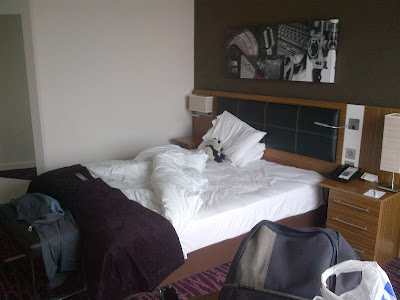 |
|
Would you pay more to have a hotel room to yourself? |
We all love a bargain and these places are incredibly cheap compared to hotels, but you get what you pay for. Hotels are primarily more expensive because they take in far fewer guests than a hostel – the amount of personal space you pay for is far greater and the walls are also a lot thicker to reduce noise disturbances. Whereas in such hostels, well they pack them in and that is why they are so much cheaper than hotels. There is also no guarantee at all that the people you meet will be friendly or that you will even want to speak to them. Do not turn up at such places expecting everyone to be ready to make friends – keep your expectations realistic. If you are after a more sociable experience, I recommend trying AirBNB – you could be hosted by locals and have that same quality interaction whilst getting a decent night’s sleep at a very reasonable price. (And there can be some incredible bargains to be found on AirBNB.)
Have I experienced something similar?
I did actually in Melaka about two years ago – I just needed a place to stay for one night and found a place called Casa Blanca Guest House: the price was ridiculously cheap, the location was great and I managed to get an air-conditioned private room. What could go wrong? I turned up and the place was crawling with the most noisy, most obnoxious PRCs (China nationals). Even the Hokkien-speaking manager apologized profusely to me about the PRCs – he placed me in a part of the guest house as far away from them as possible. In the morning, I met a Dutch couple over breakfast – they were traveling through Singapore and Malaysia and I had a lovely chat with them, giving them travel advice. The French couple also complained about the very noisy PRCs. That was such a shame because if not for the PRCs, that would have been a perfect little guest house as the Malaysians running the place were such incredibly nice people.
 |
|
I generally dislike youth hostels. You get what you pay for! |
Look, what I am about to say is going to come across as racist but really, I don’t care: I don’t mind meeting and befriending tourists like that – but I would avoid any establishment which attracted that many PRCs. The Hokkien owner told me that the guest house had received some very good reviews on a Chinese travel website, hence he started getting a lot of bookings from China recently. I am ethnically Chinese (well technically speaking, I’m mixed, but mostly Chinese anyway) so I can say horrible things about Chinese people without coming across as racist – tourists from China are so badly behaved, I would go out of my way to avoid them as far as possible. Mind you, other establishments that do not attract Chinese tourists are not much better because they tend to attract young people who want to party all night (when the rest of us want to sleep). If in doubt, look for family-friendly establishments: that means that you’re probably going to get a much better night’s sleep. You were warned: you get what you pay for.
Scenario 5: Street food agony
“I went to visit the famous night market and as you would expect, it was street food everywhere, it all looked very colourful and exotic. Everything was so cheap, so I tried a few things and suddenly, my felt this terrible sensation in my body. I had difficulty trying to breathe, I felt very dizzy and nauseous. My friends had to hold me and I sat down by the pavement. I felt my tongue and throat swelling up suddenly and my nose was running. I was panicking, I didn’t know what was going on. My friend Sarah quickly identified it as an allergic reaction to something I ate and she told me to stick my fingers down my throat to induce a vomit, to expel whatever I had just eaten. Luckily, I was able to do just that – it wasn’t pretty at all, I projectile vomited into a foul rubbish-strewn storm drain by the side of the road. Sarah then made sure I drank plenty of water to flush out the toxins and I was much better within an hour. I wasn’t sure what triggered that violent allergic reaction as I had eaten a few different things. Actually, I don’t have any food allergies I am aware of, but then again, I was eating such exotic street food that I had never tried in my life before and I had no idea what was in some of those snacks. I would be a lot more careful in the future about trying exotic street foods like that!”
|
Street food in Marrakech, Morocco |
Is this believable?
I suppose, I’m not totally convinced though – whilst there are people who do have food allergies and can have a very violent reaction to certain foods, I am also too aware of white people who turn their noses up at anything spicy or unfamiliar. If you do have food allergies (such as to nuts or shellfish), always make sure you know the contents of anything you are going to eat before trying street food. If you do not have any allergies, you could still fall victim to food poisoning if the food wasn’t prepared properly. Now there is a difference between having an allergic reaction to food and suffering from severe food poisoning and in the story above, it does sound like the writer was indeed suffering from an allergic reaction, which is somewhat puzzling as she claimed that she is not aware of having any existing food allergies. When trying street food, always buy from the hawkers who are attracting the most trade – that’s probably the safest bet: if their food is good enough for the locals, then it must be safe to eat. Also, always make sure it is properly cooked – so something that is piping hot and freshly cooked is always safer than something that is cold.
If you do suffer from a violent allergic reaction to something you ate, always seek medical advice. Go to the hospital if you really feel unwell. I note that in this story, the writer felt better after she vomited and drank plenty of water. By the time the toxins have entered your bloodstream to trigger off an allergic reaction, trying to expel it by throwing up wouldn’t expel all the toxins which are already in your bloodstream – it merely prevents any more toxins within the undigested food in your stomach from entering your bloody stream. It is not a bad idea to induce a vomit under such circumstances, but you need to understand what is going on in your body: an allergy develops when the body’s immune system reacts to an allergen as though it is a threat, like an infection. It produces antibodies to fight off the allergen, in a reaction called the “immune response”. The next time a person comes into contact with the allergen, the body “remembers” the previous exposure and produces more of the antibodies. This causes the release of chemicals in the body that lead to an allergic reaction – so always seek proper medical attention if the symptoms persist.
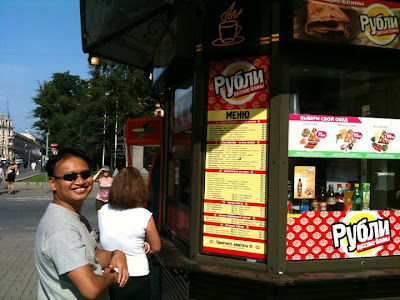 |
|
At a roadside snack kiosk in Russia |
Have I experienced something similar?
Sure I have had bad bouts of bad food poisoning in places like Morocco, Indonesia, China, Mexico, Albania and Sri Lanka after having had street food, but no, I’ve never suffered an allergic reaction as described by the travel writer in her story – then again, I don’t have any food allergies that I’m aware of.
So there you go, that’s my take on those five travel writing stories. Don’t get me wrong, I love reading travel writing because it gives me a chance to learn about experiences that I may never have but at the same time, I am ever so cynical about writers who allow their vanity to affect their judgment and thus they are more interested in trying to project a certain image, rather than trying to give an accurate account of what happened. What do you think? Are you a fan of travel writing? Do you trust your travel writers or do you take what they say with a large pinch of salt? Please leave a comment below, many thanks for reading.











